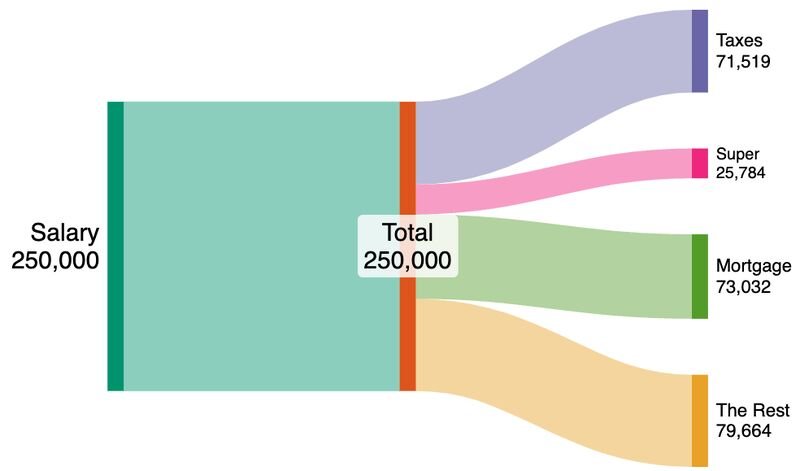Why Focusing Only on Your Next Pay Rise Could Be Holding You Back
It’s easy to get caught up in the idea of chasing that next pay rise. Who doesn’t like the thought of a bit more money hitting their account each month? But here’s the thing—focusing solely on salary increases to grow your wealth has its limits.
Let’s break it down. Say you’re on a $250,000 salary package, and you’ve got a $1 million home loan. You’d think that earning that much would leave plenty of wiggle room for enjoying life, right? Not quite. After the taxman takes his cut and you make your minimum home loan repayments, you’re left with around $79,664 to cover everything else—your lifestyle, your goals, your family’s future.
It’s not nothing, but it’s not going to create the life of financial freedom many people imagine.
Why Investing is the Smarter Play
The key to building lasting wealth isn’t just in earning more but in having your money work for you. Think of investing as a way to multiply your efforts rather than just adding to them.
For example, let’s say you’re on a great income and have some spare cash after your expenses are sorted. Simply leaving that money in a savings account or waiting for the next bump in salary could actually slow your progress toward real financial freedom. Instead, putting that money into investments—whether it’s property, shares, or another asset class—opens up far more potential for growth.
The Power of Growth Today, Income Tomorrow
If you’re earning a solid income, it’s worth considering investments that provide growth today and the option to convert that growth into income later when you might want to work less. You don’t have to give up your lifestyle now to prepare for a more secure, comfortable future. With the right strategy, you can have both.
For instance, growth-focused investments like shares or property can build value over time. As that value increases, so do your options. Whether it’s selling assets for a lump sum when you need it or converting that growth into passive income streams, the goal is flexibility. When you’re ready to wind back the work hours or transition into a new phase of life, your investments can provide a safety net or even replace your salary entirely.
Don’t Just Rely on Your Salary
At the end of the day, relying on pay rises alone won’t give you the security or freedom most people are after. Yes, earning more is helpful, but it’s only one part of the bigger picture. The real power lies in what you do with that extra money once it’s in your hands.
If you’re on a good income, maybe it’s time to start thinking differently. Focus less on the size of your paycheque and more on the potential of your money to grow—without you constantly working for it.
Where to Go from Here
Are you relying too much on your salary to build wealth?
What’s your current approach to investing, and is it giving you the flexibility you need for the future?
Have you explored options for growth investments that could provide a passive income when you’re ready to slow down?
These are the questions that help people take control of their financial future—without needing that next pay rise to feel secure.
Want to know more?
1) You can click here to book a free 15-minute free clarity call with Sam Woodhouse to discuss how this may relate to you.
2) Join our Your Money Simplified email list to start taking control of your money today. And when you subscribe, I'll give you a PDF called My 3-Step Process for Building Your Road Map to Financial Freedom.
The information contained in this article is general information only. It is not intended to be a recommendation, offer, advice or invitation to purchase, sell or otherwise deal in securities or other investments. Before making any decision in respect to a financial product, you should seek advice from an appropriately qualified professional. We believe that the information contained in this document is accurate. However, we are not specifically licensed to provide tax or legal advice and any information that may relate to you should be confirmed with your tax or legal adviser.

